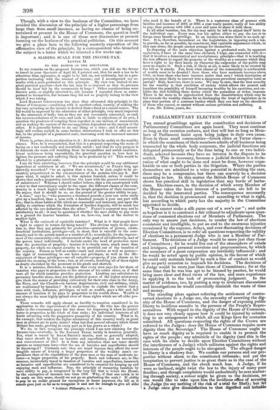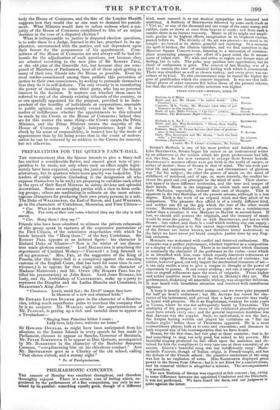PARLIAMENTARY ELECTION COMMITTEES.
THE annual grumblings against the constitution and decisions Of Parliamentary Committees are again heard. They must continue so long as the occasion endures, and that will last so long as Mem- bers of Parliament insist upon being judges in their own cause. Even in those small communities—Greek cities or Tartar clans— in which the scantiness of their members admits of all business being transacted by the whole body corporate, the judicial functions are delegated permanently or for the time being to one or two indivi- duals, selected because they have no interest in the dispute to be settled. This is necessary, because a judicial decision is a decla- ration of what ought to be done and must be done, however unpa- latable to one or both parties in the litigation. Where the parties themselves are admitted to a voice potential in deciding the case, there may be a compromise, but there can scarcely be a decision according to law. In this matter the British House of Commons shows less practical skill in legislation than any horde of barba- rians. Election-cases, in the decision of which every Member of the House takes the keen interest of a partisan, are left to be decided by the interested parties. The consequence necessarily is, that the decision is pronounced not according to what is right, but according to which party has the majority in the Committee appointed to decide. "You cannot make a silk purse out of a sow's ear "; and quite as hopeless is it to construct a fair tribunal to adjudicate upon ques- dons of contested elections out of Members of Parliament. The only way to secure just decisions, to render the law of elections consistent and intelligible, to put an end to the enormous injustice occasioned by the expense, delays, and ever-fluctuating decisions of Election Committees, is to refer all questions respecting the validity of elections to a permanent Judge who is not a Member of Par- liament. The decisions of a Judge would be more just than those of Committees ; for be would live out of the atmosphere of cabals and intrigues, and personal aversions and prepossessions, by which the members of a great corporation are inevitably influenced ; and he would be acted upon by public opinion, in the favour of which he could only maintaiii himself by such a line of conduct as would give no party occasion to impeach his decisions. The decisions of a Judge would be •more just than those of Committees ; for at the same time that he was less apt to be biassed by passion, he would bring more clear and fixed views of the law, and more experience in applying it to the task of pronouncing judgment. In the matter of evidence, too, by putting a stop to irrelevant discussions and investigations he would essentially diminish the waste of time and money.
The standing pleas against referring the settlement of contro- verted elections to a Judge are, the necessity of asserting the dig- nity of the House of Commons, and the danger of exposing public liberty to insidious assaults in the persons of the People's Repre- sentatives. With regard to the dignity of the House of Commons, it does not very clearly appear how it could be injured by submit- ting to an arrangement to which all our Kings have for centuries submitted. All questions respecting the rights of the Crown are referred to the Judges : does the House of Commons require more dignity than the Sovereign? The House of Commons ought to have as much dignity as is required to enable it to protect the rights of the people ; any adminicle of its dignity (and this is the case with its claim to decide upon Election Committees without the interference of a Judge) which militates against the rights and interests of the people ought to be abrogated. The alleged danger to liberty is a shadowy fear. We confide our persons and our pro- perties without alarm to the constituted tribunals ; and yet the temptation to pervert justice is as great there as in the case of the House of Commons, and the cheek much less. A Judge, if he were so inclined, might twist the law to the injury of many poor families ; and though complaints would undoubtedly be sent mutter- ing through society, a colour might be given to the decisions, no one would like to take upon him the invidious office of accusing the Judge (to say nothing of the risk of a trial for libel); but let a Judge once pre dissatisfaction to that dignified and irritable
body the House of Commons, and the fate of the London Sheriffs suggests how they would rise as one man to demand his punish- ment. What Minister would dare to refuse redress when a ma- jority of the House of Commons complained to him of an unjust decision in the case of a disputed election ?
What is indispensable to justice in disputed election questions, is to refer them to a Judge, learned in the law, practised in its ap- plication, unconnected with the parties, and not dependent upon their favour for the permanence of his appointment. Com- mittees of the House of Commons are and always will be bad tri- bunals for the adjudication of such questions, not because they are selected according to the new plan of Sir ROBERT PEEL, or the old plan of the Grenville Act, but because they are com- posed of Members of Parliament, bent all of them upon getting as many of their own friends into the House as possible. Even the most tender-conscienced among them palliate this perversion of justice to their own consciences, by seeking to persuade themselves that they do it in self-defence. The only remedy is in transferring the power of deciding to some third party, who has no personal interest in the decision. It matters not whether these cases be referred to any of the already existing tribunals of the country, or to one specially appointed for the purpose, provided it be inde- pendent of the hostility of individuals or corporations, amenable to public opinion, and competently versed in the law. It is a matter of indifference whether the appointments to this tribunal be made by the Crown or the House of Commons; indeed they are for this matter the same thing—the Crown means the Prime Minister, and the Prime Minister means the majority of the House of Commons. A judge's independence, kept in due check by his sense of responsibility, is insured less by the mode of appointment than by his being aware that in the event of malver- sation he can be removed by an address to the Crown for removal, but not otherwise.



























 Previous page
Previous page